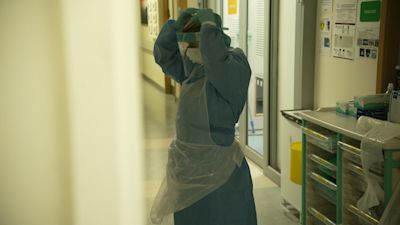Insight
Covid pushes Northern Ireland hospitals to brink with patients forced to wait 48 hours for a bed

Northern Ireland's health service is overwhelmed due to a fourth Covid surge, ITV News Health Editor Emily Morgan reports
Something worrying is happening in Northern Ireland. Its health service is falling apart.
That might sound a little glib but talk to any doctor, nurse, patient or even the province's health minister and they will all say the same.
Hospitals there have been struggling to cope with some of the worst pressures ever experienced for years now, add a pandemic into the mix and they're now operating on a knife edge, day in day out.
Covid has never gone away in Northern Ireland and hospitals are now dealing with a fourth surge which none of them were expecting.
This surge has come just as we go into winter and as staffing levels across the board in the service are at rock bottom.
In fact, health minister Robin Swann has just launched a workforce appeal to encourage anyone thinking about applying to work in the service to come forward, whether they're nurses, retired doctors, caterers, cleaning staff or porters.
It has got so bad, the health minister is begging people to help out.
A&E consultant Dr Brendan Lavery describes the 'unrelenting pressure' Covid has put on the health service
The staffing crisis might help explain why Altnagelvin Area Hospital in Londonderry is on its knees.
The Trust that operates it and two other hospitals in the area is said to have around 1,000 members of staff off work due to Covid related causes.
Altnagelvin is desperate for more people to respond to the workforce appeal just to keep it ticking along.
Their own staff are working every hour they possibly can to ensure the system doesn’t collapse. I met Jonah, a theatre nurse, whose own children answered the workforce appeal and are now working as cleaners between their college studies.
Then there was Dr Brendan Lavery, an A&E consultant, who’d been up until 1am the night before trying to sort out beds and space for his patients. The hospital is still running but only because its dedicated staff are making sure it does.
Coronavirus: What you need to know
Then there's the patients.
Both Covid patients and non-Covid. It is now normal for the hospital to operate over capacity - bearing in mind it isn't supposed to go over 85%, it is regularly at 105%.
When they say there's no give in the system, they really mean it.
The Accident and Emergency department has around 17% more patients than it did this time last year. It's usual for about 200 patients a day to come through its doors and a great many of them sit around on trolleys or in chairs waiting for a bed just to be seen.
Since the summer the department has been putting appeals out asking people to use the Phone First service before going to A&E and to expect long delays unless it really is an emergency.
Some patients I saw while I was there had been waiting in A&E for a bed on a ward for more than two days.
Is that really acceptable? It's a question I put to Dr Lavery, the consultant on shift. He explained that they simply don't have a choice.
Ten percent of the hospital's beds are still taken up with Covid patients so there is a constant bottleneck getting into the rest of the hospital.
This has been the problem all summer and they haven't even started seeing flu patients or the usual winter admissions. While I was visiting, there were 20 patients waiting for a bed, that's a quiet day apparently, since double that number was waiting on Monday.
Covid has a lot to answer for at Altnagelvin and indeed in Northern Ireland overall.
In the week ending October 1, 12.6% of deaths involved Covid - the highest proportion in the UK and almost double that of England at 7.3%. It means hospitals, many with relatively small intensive care units, are again struggling to cope with Covid.
The knock on effect is that beds are at a premium and staff are needed like never before.
There isn't one answer to why Covid is still affecting Northern Ireland so badly.
It may have something to do with the nation's higher levels of chronic disease and social deprivation compared to other parts of the UK. It may also be down to the poor vaccine uptake in younger people.
Only 76.5% of the population is fully vaccinated, behind England at 78.4%, Scotland at 80.9% and Wales at 81.2%. It might sound a marginal difference but it is thousands of people, many of whom are ending up in intensive care because they didn't get jabbed.
In fact, the consultant I spoke to said the majority of patients in ICU now are unvaccinated patients in their 30s and 40s.
He's even seeing pregnant women coming in needing intensive care, something that's in line with the rest of the UK, and it's a worrying trend.
I haven't even mentioned waiting lists, which are of the worst in the UK - nearly a quarter of the population is either waiting to see a consultant or waiting to start hospital treatment. Good luck to those 460,000 people.
The staff I met are doing everything they possible can to juggle beds, see patients and keep the hospital flowing.
But with Covid, flu, winter on the way and staffing levels like they are, I am not confident that waiting list is going to get any better anytime soon.
The health service is in dire straits in Northern Ireland and it is no laughing matter.